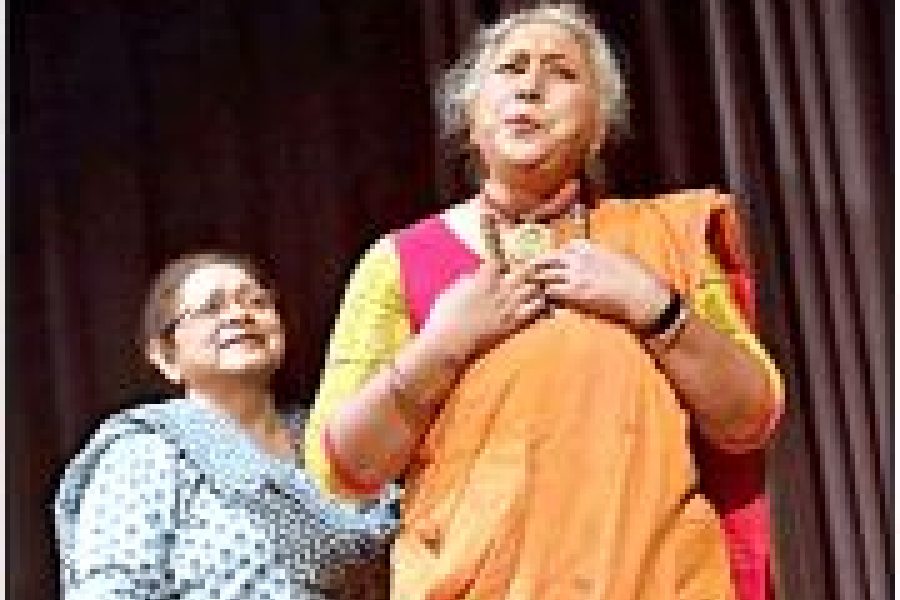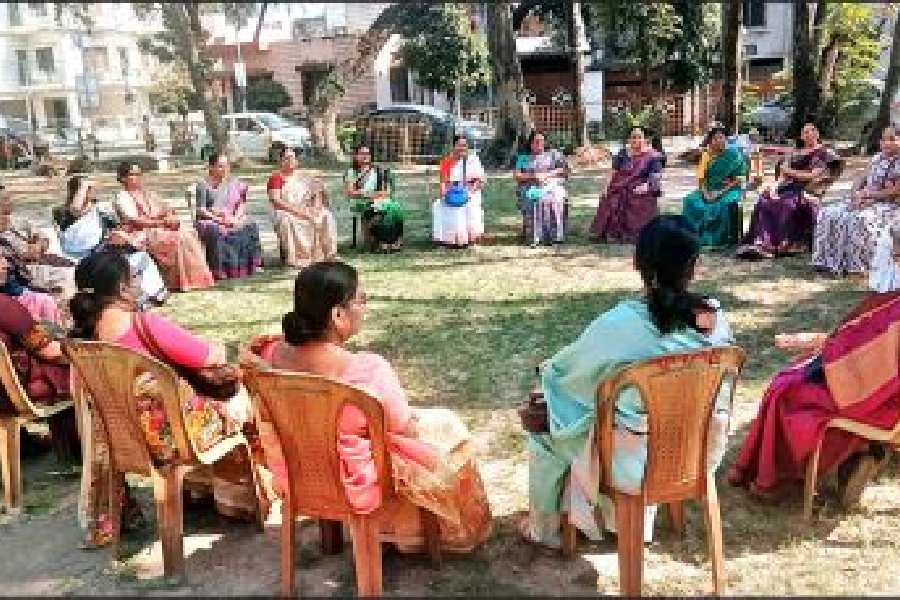A SENIOR citizens’ get-together at BA Block gave over 100 residents a chance to celebrate their second childhood. The event featured a variety of cultural and sports activities.
It kicked off with a performance of Tagore’s Ektuku chhoya lage by Ishta Nath.
“I am reciting on stage after many years. I’ve chosen Tagore’s Dhulamandir, which we had lear nt in school,” said Shishir Ganguly before his performance. Octogenerian Sudhangshu Kiran Dutta recited and also paid tribute to melody queens Lata Mangeshkar, Sandhya Mukhopadhyay and Nirmala Mishra.
The senior-most member of the forum, Ashok Bhattacharya who is in his late eighties, sang Fagun legechhe bone bone. Kalpita Saha and Madhuchhanda Ghosh sang, Saikat Pakrasi read out a self-written story and Baishakhi Patra recited a self-composed poem, both on ageing.
“Senior citizens are the major driving force in our block. They have sacrificed a lot with their time and energy since the 80s for the development of our association. Demographically we live in a young country but ironically we reside in an ageing neighbourhood and many such residents are living alone. So it’s important to ensure bonding amongst us,” said president Arunava Das, before reciting Shankha Ghosh’s Babumashai.
Former president Ashok Bhattacharya sang a song about the spring and secretary Prasenjit Saha spoke about the importance of preserving Bengali culture. The event concluded with games like passing-the pillow for women, that was won by Shukla Basu and hitting the wicket, won by Mihir Ranjan Dasgupta.
The show was anchored by Ranjan Dasgupta and Sisir Ganguly.
Play time

A scene from the play Na Hanyote
THEATRE GROUP Britya presented two plays of radically different flavours for the audience at Rabindra Okakura Bhavan. One was an imaginary meeting of three similar characters from mythology and the second was based on a real-life political murder.
Aloukik Sanglap, by Shishir Kumar Das, imagined a conversation between three mythological women — Savitri, Behula and Orpheus. Savitri followed the god of death till he relented to return her husband back to life. Behula sailed to heaven with her dead husband’s body and again, pleaded with the gods till they let him return.
While these women were from Hindu mythology, Greek mythology offers Eurydice, who was on the other side of a similar situation. She got bitten by a snake on her wedding night and her husband Orpheus descended to the underworld to seek her return. But in the Indian tale, he does not succeed. Eurydice (played by Nibedita Dhar) tells the other characters about her long wait for her husband to meet her in his afterlife.
Kaberi Paul, who played Savitri, said they needed perfect light, music and acting to create the aura of mystery that the script demanded. “I also want to mention the contribution of Bani Chakraborty, a silent but hardworking crew member. She helped me dress up today.”
Rajasri Ghosh was delighted to play Behula, the new bride. “It was a 20-year-old trip down memory lane for me, to the time I myself got married. Today I wore the Benarasi sari and ornaments I had worn at my own bou bhat. Also, thus far I had only played minor roles. This was my first important role and brought me much satisfaction,” smiled the Purbachal resident.
The second play Na Hanyote, by Sibankar Chakraborty, was based on the life of Gauri Lankesh, the journalist murdered in Bangalore in 2017. It was about a right-wing extremist group threatening a newspaper editor to toe their line. The star reporter refuses to back down, resigns, starts her own publication and is murdered by miscreants. The play conveys the message that such courageous journalists never die.
“This piece was different from other social dramas I’ve been a part of. It was challenging to transform myself into the character inspired by Lankesh,” said Nandita Chatterjee. “Arup Ghosh, the co-director of the play who also played the role my editor, guided me.”
Krishnendu Banerjee, who played the right-wing fundamentalist leader, said his character was diametrically opposite to his nature and hence tough to pull off.
Bijan Ghosh, who directed the first play and co-directed the second, said they had tried to present the plays in a new dimension. “I have invited feedback from the audience to further enrich our productions,” he said.
